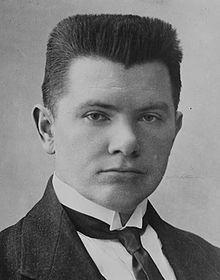Augustinas Voldemaras | |
|---|---|
 | |
| 1st and 12th Prime Minister of Lithuania | |
| In office 11 November 1918 – 26 December 1918 | |
| Succeeded by | Mykolas Sleževičius |
| In office 17 December 1926 – 23 September 1929 | |
| President | Antanas Smetona |
| Preceded by | Mykolas Sleževičius |
| Succeeded by | Juozas Tūbelis |
| Minister of Foreign Affairs | |
| In office 11 November 1918 – 19 June 1920 | |
| Prime Minister | Himself Mykolas Sleževičius Pranas Dovydaitis Ernestas Galvanauskas |
| Succeeded by | Juozas Purickis |
| In office 17 December 1926 – 23 September 1929 | |
| Prime Minister | Himself |
| Preceded by | Mykolas Sleževičius |
| Succeeded by | Juozas Tūbelis |
| Minister of Defense | |
| In office 11 November 1918 – 24 December 1918 | |
| Prime Minister | Himself |
| Succeeded by | Mykolas Velykis |
| Personal details | |
| Born | 16 April 1883 Dysna, Sventsyansky Uyezd, Vilna Governorate, Russian Empire |
| Died | 16 May 1942 (aged 59) Moscow, Russian SFSR, Soviet Union |
| Political party | Party of National Progress (1916–1924) Lithuanian Nationalist Union (1924–1929) |
| Spouse | Matilda Voldemarienė |
| Alma mater | Saint Petersburg Imperial University |
Augustinas Voldemaras (16 April 1883 – 16 May 1942) was a Lithuanian nationalist political figure. He briefly served as the country's first prime minister in 1918 and continued serving as the minister of foreign affairs until 1920, representing the fledgling Lithuanian state at the Versailles Peace Conference and the League of Nations. After some time in academia, Voldemaras returned to politics in 1926, when he was elected to the Third Seimas.
Dissatisfied with the left-wing government of President Kazys Grinius, Voldemaras and fellow nationalist Antanas Smetona supported the military coup d'état in December 1926 and he was appointed as the prime minister for a second time. A brilliant orator, Voldemaras represented the radical wing of the Lithuanian Nationalist Union that was increasingly critical of the more moderate policies of President Smetona. Smetona had Voldemaras removed from office in September 1929 and exiled to Zarasai. Voldemaras was arrested in 1934 after the failed coup against Smetona and served a prison sentence until exiled to France in 1938. Returning to Lithuania soon after the Soviet occupation of Lithuania, he was promptly arrested by the Soviet authorities and died in their custody in Moscow.[1]
- ^ Alfred Erich Senn (2007). Lithuania 1940: Revolution from Above. Brill. p. 140. ISBN 9789401204569.